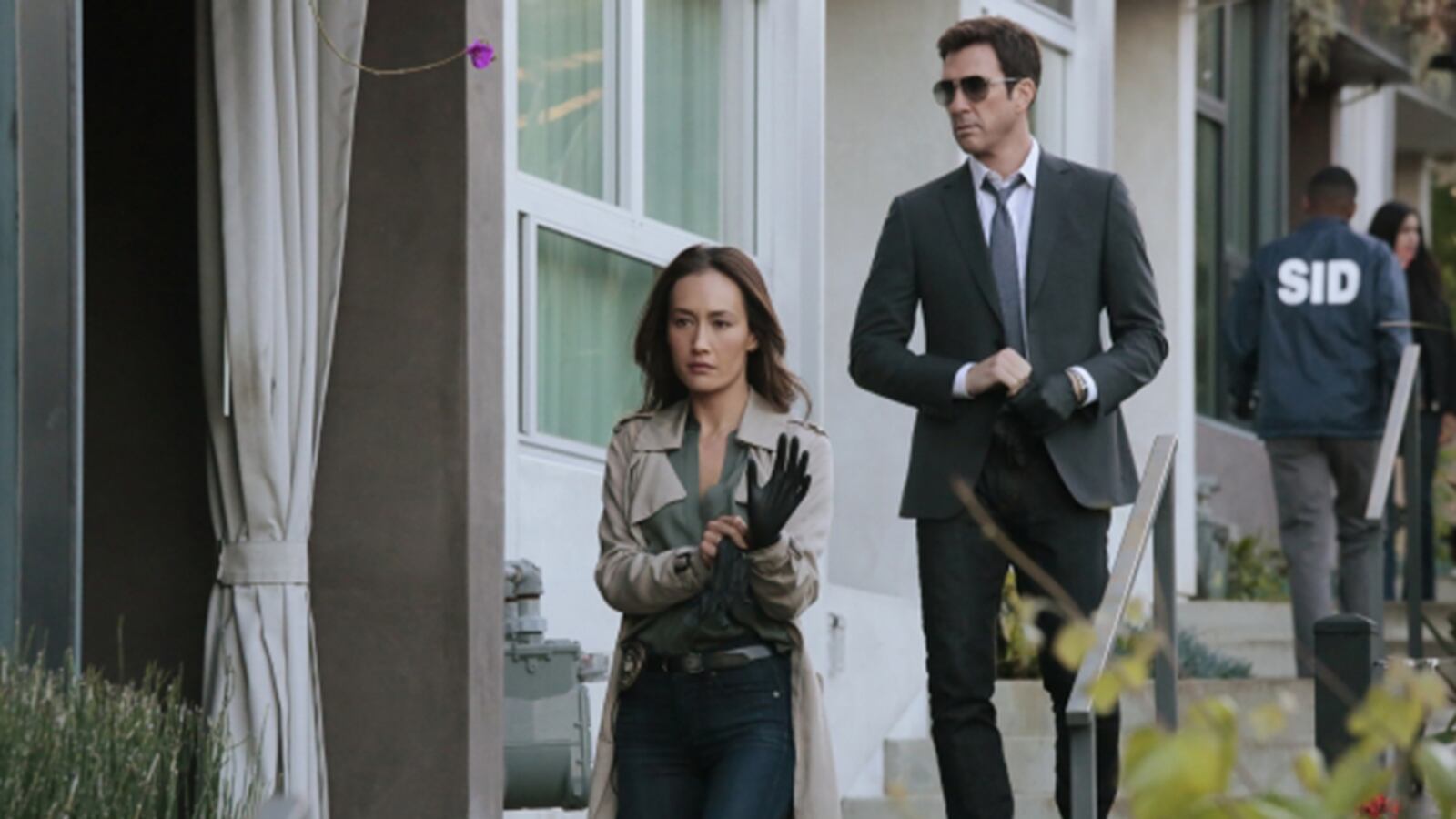Stalker isn’t misogynistic scare porn. It’s far worse: a dumb PSA for the dangers of misogyny, delivered with the grace of the NFL and narrative heft of a pornographic film. CBS’s procedural bludgeons viewers not with nihilistic glee or gore or hate for women, but with juvenile dialogue about the evils of men.
“It’s a man, let’s face it,” says Dylan McDermott, a lothario detective who spends much of the episode stalking his ex-wife (hey, nobody’s perfect). “The violence of burning someone alive has us men written all over it.”
Perhaps the sadistic crime he’s referring to does have “men written all over it,” but on this television show it’s not written very well. In the pilot’s opening scene the stalker lurks in the shadows in a hoodie and creepy mask, douses a woman in gasoline, locks her in her car, lights the car on fire, and watches it explode. She screams.
If only there was something to really scream about! There is no terror, no horror, no deep, chilling psychology of a killer here. Instead, our villain makes a few unsolicited phone calls and pops into the camera’s frame when you least expect it, and when it doesn’t make logistical sense. There’s a stalker around the corner, stalker outside the elevator, stalker in the ceiling, stalker under the rug. (The murder scene, which many have criticized, is hardly gratuitous—what about True Detective, the ultraviolent The Following, or even the music video for Maroon 5’s “Animal”?)
So the real meat of Stalker, ostensibly, is the pseudo-intellectual conversation about misogyny. It’s just awful.
In the first 13 minutes—after some statistics about how stalking is rampant, especially in the Internet age—Maggie Q, a fearless lieutenant on the stalker beat, investigates the “gruesome” killing in a mostly unbuttoned blouse. The camera lingers enough for us to glimpse her cleavage and a bit of her black bra. In Stalker, perverted men aren’t the only things peeking out of the shadows.
Speaking of perverted men, after examining the crime scene (“In the bathroom she has a clear shower curtain so no one can hide behind it, a platform bed close to the ground so no one can hide under it.”), McDermott loosens his tie. Like Q, he’s conveniently missing a button and his shirt dips just low enough to reveal a few sprouts of chest hair.
“I’m sorry I stared at your breasts,” he says, looking and sounding like he belongs on Miami Vice. “That’s why you don’t like me. When we first met I looked at your breasts.”
“Why did you do it?” Q says.
“You’re wearing a silk blouse, hint of a bra, red fingernail polish. I took the male leap that it was meant to be noticed, let my eyes linger in hopes that you would be flattered.”
To some, this scene will be a revelation. “Bro, I was totally staring at that chick’s rack.” Really though, it plays like a tired gimmick and one of the worst ways to fool: show us something—a breast, a seemingly empty closet—and then punish us as soon as we get comfortable.
Stalker’s attempt to tackle misogyny in a one-hour primetime network procedural seems valiant enough. Yet the show stumbles not only because it has little of substance to say, but because its suspected stalkers are only caricatures of diabolical men: a balding, bearded, and bored middle-aged dud; a young gym bro who dabbled in softcore porn; and an angry black guy who lives next door.
These men are nothing like the sensitive stalker and serial killer in The Fall. In those meticulously plotted murders, Jamie Dornan (soon to be seen tying women up, again, in Fifty Shades of Grey) slinked into homes, played with the women’s underwear, and monitored his “prey” in public and on his computer. He’d sneak back in days later to choke his victim and pose the corpse for photographs for him to masturbate to. Each episode showed his other life as a father, a grief counselor, and a generally likable person.
Or consider the haunting opening scene of Series 3 of Luther. We watch as a woman arrives at home and changes in her room. The camera stays on her, flipping from angle to angle. After she goes to sleep, a man slides out from under her bed.
Yet in Stalker, there is no room for nuance (the episode ends with Radiohead’s “Creep”). The stalker is upset that a girl didn’t want to date him. That’s why he set her on fire; that’s why McDermott saves the day by shooting him dead.
“All right, I’m just going to say it,” McDermott says shortly after, asking a question that probably was perplexing a scary percentage of the 9.1 million people who ignored the abysmal Metacritic rating and tuned in to watch Stalker. “Why do you wear sexy things if you don’t want men to notice?” “For how I feel in them,” Q says, dressed conservatively and, for the first time, responding to his incessant, idiotic bloviating. “I dress for myself.”





